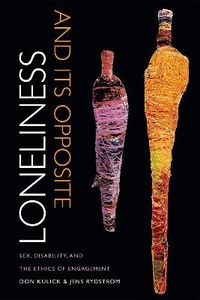
spara 46%
5+ säljare
Loneliness and Its Opposite
Few people these days would oppose making the public realm of space, social services and jobs accessible to women and men with disabilities. But what about access to the private realm of desire and sexuality? How can one also facilitate access to that, in ways that respect the integrity of disabled adults, and also of those people who work with and care for them?
Loneliness and Its Opposite documents how two countries generally imagined to be progressive engage with these questions in very different ways. Denmark and Sweden are both liberal welfare states, but they diverge dramatically when it comes to sexuality and disability. In Denmark, the erotic lives of people with disabilities are acknowledged and facilitated. In Sweden, they are denied and blocked. Why do these differences exist, and how do both facilitation and hindrance play out in practice?
Loneliness and Its Opposite charts complex boundaries between private and public, love and sex, work and intimacy, and affection and abuse. It shows how providing disabled adults with access to sexual lives is not just crucial for a life with dignity. It is an issue of fundamental social justice with far reaching consequences for everyone.
Utgiven: 2015
ISBN: 9780822358336
Förlag: Duke University Press
Format: Häftad
Språk: Engelska
Sidor: 376 st
Few people these days would oppose making the public realm of space, social services and jobs accessible to women and men with disabilities. But what about access to the private realm of desire and sexuality? How can one also facilitate access to that, in ways that respect the integrity of disabled adults, and also of those people who work with and care for them?
Loneliness and Its Opposite documents how two countries generally imagined to be progressive engage with these questions in very different ways. Denmark and Sweden are both liberal welfare states, but they diverge dramatically when it comes to sexuality and disability. In Denmark, the erotic lives of people with disabilities are acknowledged and facilitated. In Sweden, they are denied and blocked. Why do these differences exist, and how do both facilitation and hindrance play out in practice?
Loneliness and Its Opposite charts complex boundaries between private and public, love and sex, work and intimacy, and affection and abuse. It shows how providing disabled adults with access to sexual lives is not just crucial for a life with dignity. It is an issue of fundamental social justice with far reaching consequences for everyone.
Begagnad bok
199 kr365 krSpara 166 kr (46%) mot nypris
Fri frakt & skickas inom 1-3 vardagar
Köpskydd med Studentapan
Varje köp täcks av Studentapans köpskydd som säkerställer att boken kommer fram, att du får rätt bok och att skicket stämmer överens med beskrivning.



